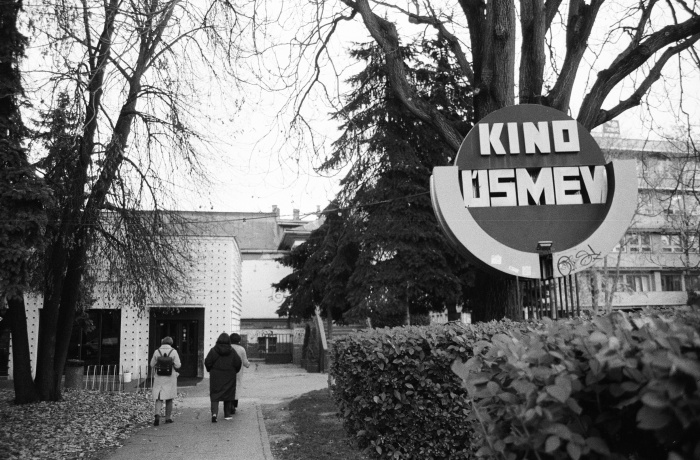
On 7 November, Kseniia Opria, the editor of the Docudays UA website and the Electronic Catalogue of Ukrainian Documentary Films, took part in the panel discussion Preservation, Restoration and the Future of Ukrainian Cinema by the SoliDARE project at the Kino Úsmev Audiovisual Cultural Centre in Slovakia. Here are her reflections and film photos describing her impressions of the event.
“A cinephile meets cinephiles, they discuss films and find out that they have a lot in common in real life” — this is how I would like to describe my experience in Slovakia. However, before my conversation in a cosy cinema, I had to travel a long way, 24 hours: from Kyiv to Chop [a city located in western Ukraine, near the borders of Slovakia and Hungary — ed.], waiting for a new train, and then from Chop to Košice, overcoming passport and customs control.
It was on this day, 5 November in the evening, that I set off — at a time when people were anticipating the resonant results of the US election. I knew that I would wake up in a slightly different reality, but I also realised that I had to keep going, metaphorically and literally, under any circumstances.
Before going to bed, I was preparing for the conversation, reading about Slovakia and its history, flipping through the news about Prime Minister Fico, who had just returned from talks with China. About President Pellegrini — the media recently reported that he had banned citizens of his country from joining the Armed Forces. I also learned about the opposite world of the Kino Úsmev space: systematic residencies, workshops, and retrospective screenings that seek to develop a dialogue between the Ukrainian and Slovak communities through cinema.
The morning was full of news about Trump, and Chop was calm, but something else caught my eye — planes in the sky! During the two years of the great war, this became a memory for me from the time when it took only a few hours to get to Europe. The border village near Hungary and Slovakia had a unique opportunity to watch the steel birds in the common sky with the neighbouring countries every hour.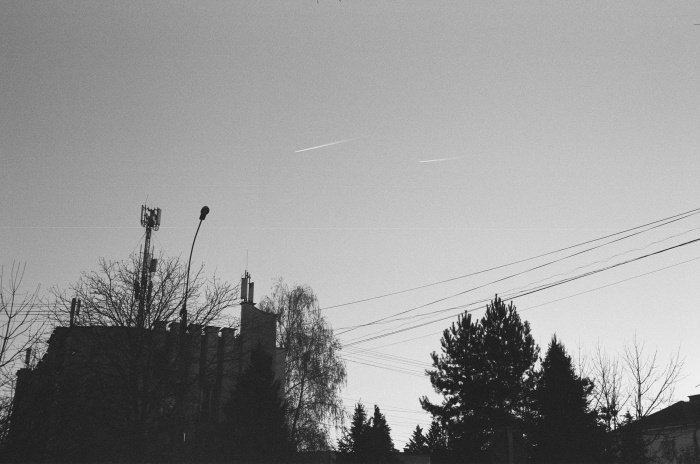
Chop. Planes.
The train to Košice consisted of two carriages, mostly filled with mothers who wanted to meet their children abroad, so our flight was jokingly called the “mummy train”. But there were exceptions. It turned out that my colleagues, who were also on their way to the discussion from Lviv, were sitting next to me — the manager of the Lviv Film Commission, Viktoriia Yavir, and representatives of the Hnat Khotkevych City Palace of Culture, Mariana Zahoruiko and Nadiia Brylynska.
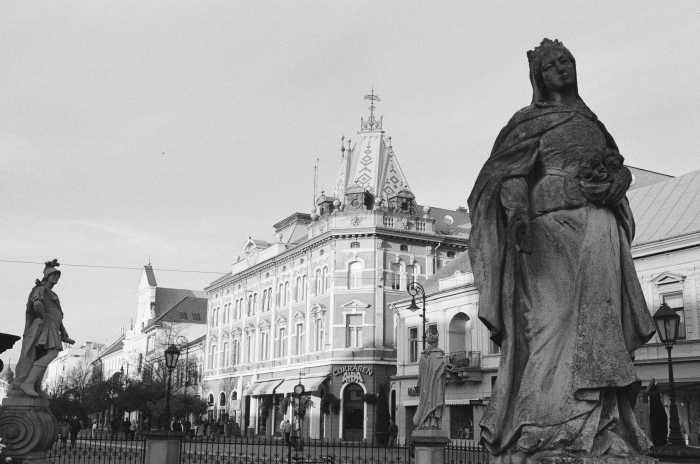
Košice. The city centre.
The Slovakian city greeted me warmly, like an island of safety. I felt like a savage, admiring the castle and the Gothic cathedral, the bright shop windows that were already preparing for Christmas. I was amazed that you could walk the streets at night, because there were no curfew rules, which are now a Ukrainian reality.
But in the end, the main interest was the conversation about cinema. On the day of the event, we met the project manager of the Kino Úsmev space, Kristina Novosadova, who showed us around the cinema and introduced us to the team. I felt the vibe of the Cinema House; there was also a lively bar like our Babylon, a community of film lovers, an authentic style that carefully filled the 1922 building with neon signs, stickers, and Polaroid photos.
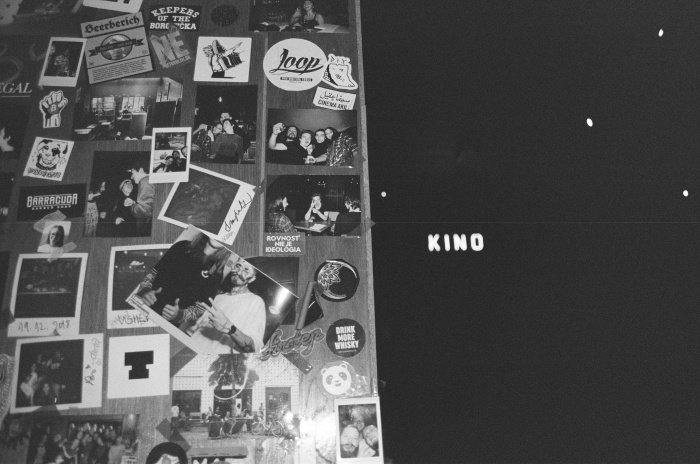
Košice. The cinema
Our discussion took place in a large red room, sitting on a leather sofa and armchairs: me, Viktoriya Yavir, the director Olena Podolianko, and Jan Melikant, the manager of the Košice Region Film Office. First, we all talked about ourselves and the projects we were presenting.
I started with Stas Kartashovʼs photos from this yearʼs Docudays UA in Kyiv, and I wanted to share some of these memories with everyone present, especially with the Ukrainians who came to the event. She also spoke about our new Electronic Catalogue of Ukrainian Documentary Films: its 60 films, 130 individuals and 59 organisations that my team and I have carefully compiled into one collection for the years 2023–2025. Its history, which began in 2014. The meanings that have accumulated and become louder. I was asked about the transformation of Ukrainian cinema over the years, and I answered in the words of our Programme Director Yuliya Kovalenko that, unfortunately, the Ukrainian film language that speaks about the war has become very high quality and sensual, because we have been living through these events for over 10 years and have been documenting the reality around us, making many attempts and research.
Speaking about the war in Ukraine and the work of filmmakers, I could not help but share about the Ukraine War Archive project and its achievements over the two years of its operation. About 8 million collected media files and over 800 documented testimonies. And, of course, about the films in the Witnesses series, which reveal different areas of the war through personal stories.
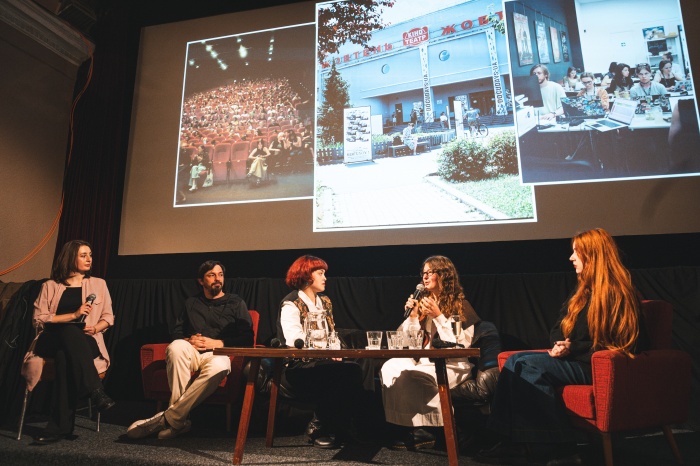
Discussion. Photos provided by the Kino Úsmev team
Filmmaker Olena Podolianko shared her experience of making films in Ukraine, and the existence of the industry not thanks to, but despite the inaction of the Ukrainian State Film Agency. Olena was a resident of the SoliDARE project and had time in Slovakia to work on her new script and learn more about the activities of her Slovak colleagues. In this context, and not only, we talked a lot about co-production and the prospects for cooperation between the countries.
Viktoriya Yavir talked about the formation of a new identity in Ukrainian cinema, the decolonial challenge, and changes in Ukrainian viewers who have become interested in films and regularly attend national premieres.
I think that our synergy was strengthened when we started to speak the “language” of the titles of Ukrainian films and their plots: This Rain Will Never Stop, Iron Butterflies, Intercepted, 20 Days in Mariupol, We Will Not Fade Away, Nice Ladies, The Editorial Office, La Palisiada, Dovbush, Stop Zemlia, Pamfir, Atlantis, The Tribe, Shadows of Forgotten Ancestors, The Colour of Pomegranate, Man with a Movie Camera… It was nice that after the discussion, the audience had the opportunity to see another new sensual film, Fragments of Ice by Maria Stoianova. This film tells the story of the directorʼs father Mikhaylo Stoianovʼs newly discovered archives of international travels and their family life at the turn of the late Soviet period.
Jan Melikant spoke sincerely about the experience of Slovak cinema. About high-quality documentaries in their country. About the search for new co-productions and open questions about popular feature films, going beyond the national distribution or the festival bubble. The moderator of the conversation, Andrea Čurošová Gavalcová, was very involved in the discussion, asking questions that encouraged us to think about the strategies of Ukrainian cinema in the near future, with possible changes that will occur after Ukraine joins the European Union. I would like to find precise answers to all the questions, but so far we could only make assumptions.
The journey back was just as difficult: I left on the morning of 8 November and returned home two days later. However, the 2-hour conversation at Kino Úsmev was worth it all. Úsmev means “smile”, and thatʼs how I recall this trip: smiling, remembering new acquaintances, feeling shared empathy. Being glad that I spoke up.
With the new knowledge that there is a place with a Cinema House vibe 830 kilometres from my home.
The SoliDARE project was held jointly with the Hnat Khotkevych City Palace of Culture and supported by IZOLYATSIA.
Photo: Kseniia Opria